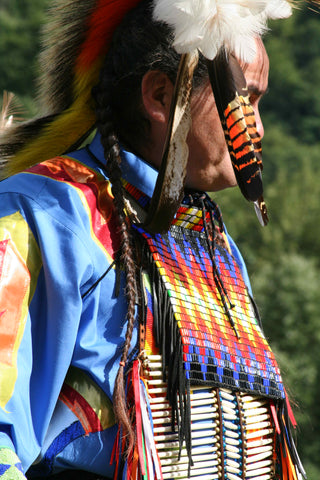Native American symbols and mascots (as attributed to the north Americans) have long been part of, or "accepted" in the cultures of many countries. In the US, especially, sports teams are named after Indian tribes, or have mascots such as tomahawks or war bonnets. For example, there are the Kansas City Chiefs and the Washington Redskins … or how about the Atlanta Braves and the Chicago Blackhawks?
The Kansas City Chiefs play in the "Arrowhead" Stadium. The logo of the Washington Redskins represents the silhouette profile of a native American Indian—complete with a couple of eagle feathers. The Atlanta Braves have a tomahawk as a mascot, and the Chicago Blackhawks Ice Hockey team also has the profile of a smiling native American with feathers in theirs.
Is this cultural appropriation or, simply (and appropriately), cultural reference? What do these teams mean by taking on these mascots, names, and symbolism?
History itself proves otherwise. Many of these teams—there are literally hundreds of them—having been founded many years ago, appropriately adopted the "implied meanings" of symbols and tribal names attributed to the native American fighters (acknowledging that they are the fiercest warriors known in history) as their battle cries and "characteristics". They were, in fact, implying: "We will win! We are the braves, we are chiefs, we will fight until you are defeated." How is it offensive to attribute such desirable characteristics of bravery, valor, honor, and courage to known objects or symbols from the native Americans? To put it simply, when you want to symbolize "courage and valor" by using a chief headdress, isn't that even an act of "adoration"?
Some of the native American tribes have already expressed their permission for "others" to use their names or symbols: the Saginaw Chippewa Tribal Nation and the Seminole Tribe of Florida gave permission to Central Michigan University and Florida State University to use their names.
Is it cultural appropriation or "cultural reference"?
Here's a straight fact: because native American culture is part of the US history—which cannot be deleted, or denied—references to it do, and will, always exist.
So, what about headdresses, or war bonnets, and other accoutrements? There is a lot of attention in the press whenever a celebrity or other well-known figure wears any of those. Is it really bad to wear one? Is it all just media hype? In a cynical world, it would be hard not to think that, in some ways, it might be a way to advertise the very things they are criticizing, or at the very least, jumping on the bandwagon of ‘popular’ opinion. Why are we all suddenly hyper-sensitive about these minutiae?
So, do you want to weigh in on these "you-are-a-racist-if-you-wear-an-Indian-headdress" hype?
Point-of-view 1: Here's Why You Shouldn't Wear the Indian Chief Headdress
Some (patriotic native Americans) claim that wearing the symbols of these proud people is disrespectful to their culture and heritage. The headdress was earned through brave deeds and wearing it seems to be wrong.
Some argue that "imitating" native Americans is racist, or stereotyping.
Whilst still, others insist that while not directly racist, it is still "mocking" American history and native Americans should be remembered with reverence.
Point-of-view 2: Wearing an Indian Headdress is a Right of Choice
Each time someone (especially, someone famous) is pictured in a magazine or newspaper article wearing a headdress, there seems to be a huge media outcry. People, who claim to speak for whole tribes, suddenly start tweeting very loudly or writing articles about how offended they are.
Sure, they might well be offended on behalf of a tribe, but, are the native American Indians themselves offended (really, bashing a white person simply because he wore a headdress is-not racist)? Don’t forget that historically, some tribes have granted rights for others to use their memorabilia and symbolism. So, is it not the case (instead) that each time a native headdress is worn, it makes someone think and memorialize the native American culture?
Wearing a chief headdress can be a celebration of the glorious past—if the intention to wear one is not in "mockery" or "stereotyping". It can bring the wearer closer to nature and bring a kind of other-worldly peace. It could even educate others into finding out more about the history of the objects which are being worn.
If you wear a headdress, wear it with pride. Then, you are aligning yourself with the "sacred" history.


